-
ORIGINAL ARTICLE09-20-2024
Predictor variables effect on the development of Burnout Syndrome in higher education professor
Revista Brasileira de Enfermagem. 2024;77(4):e20240132
Abstract
ORIGINAL ARTICLEPredictor variables effect on the development of Burnout Syndrome in higher education professor
Revista Brasileira de Enfermagem. 2024;77(4):e20240132
DOI 10.1590/0034-7167-2024-0132
Views0See moreABSTRACT
Objectives:
to correlate the development of Burnout Syndrome in higher education professors with the following variables: sociodemographic, economic, work, sleep pattern, level of anxiety and quality of life.
Methods:
observational, analytical, cross-sectional study with a quantitative approach. Data collection took place from August to November 2022, with 140 professors from a private higher education institution in the Western Brazilian Amazon.
Results:
professors who carried out activities outside institutional hours and who had sleep duration < 5 hours, presented lower scores in the personal fulfillment dimension of burnout, with (p=0.002) and (p=0.001), respectively. The higher the scores for the physical (p=0.001), psychological (p=0.000) and social relationships (p=0.002) domains of quality of life, the lower the personal fulfillment scores for the syndrome.
Conclusions:
through linear regression, it was evidenced that several variables explain the development of burnout. Institutional and governmental actions can minimize the negative influence of these variables.
-
ORIGINAL ARTICLE09-20-2024
Construction and enhancement of a prototype for a medical-hospital equipment for hypodermoclysis: a qualitative study
Revista Brasileira de Enfermagem. 2024;77(4):e20240059
Abstract
ORIGINAL ARTICLEConstruction and enhancement of a prototype for a medical-hospital equipment for hypodermoclysis: a qualitative study
Revista Brasileira de Enfermagem. 2024;77(4):e20240059
DOI 10.1590/0034-7167-2024-0059
Views0See moreABSTRACT
Objectives:
to construct a Subcutaneous Hydration Device semi-functional prototype and gather initial information to improve this prototype design and realize its acceptance potential.
Methods:
a qualitative, descriptive and exploratory study, which used focus group, following the Technology Acceptance Model. The group was held at the Escola Superior de Enfermagem de Coimbra, Portugal, in December 2022, composed of nine participants from six different disciplinary areas, and followed thematic analysis.
Results:
four topics emerged associated with the device components: elastomeric infusion pump; needle/access device; clamp; administration set. From these topics, topics were triggered that highlighted: characteristics about the target population; ease of use and accessories; patient comfort and safety; and device application context.
Final Considerations:
the Subcutaneous Hydration Device semi-functional prototype is viable and interesting for the clinic. The results support its improvement and direct future investments for experimental studies.

-
REVIEW09-20-2024
Brazilian nursing specific situation, middle and micro-range theories: a bibliometric study
Revista Brasileira de Enfermagem. 2024;77(4):e20230520
Abstract
REVIEWBrazilian nursing specific situation, middle and micro-range theories: a bibliometric study
Revista Brasileira de Enfermagem. 2024;77(4):e20230520
DOI 10.1590/0034-7167-2023-0520
Views0See moreABSTRACT
Objectives:
to map the nursing theories developed in stricto sensu graduate programs in nursing in Brazil.
Methods:
a bibliometric study, carried out on the Coordination for the Improvement of Higher Education Personnel Theses and Dissertations Portal in October 2023. The controlled descriptors “Nursing Theory” and “Nursing Models” and the uncontrolled descriptors “Theories” and “Middle-Range Theory” were used. Selected studies were cataloged for analysis, which was conducted by the study authors, who have a doctoral degree and expertise in research on nursing theories.
Results:
thirty-nine nursing theories were mapped, with a predominance of middle-range theories (79.5%), focusing on nursing diagnostic concepts and use of the theoretical-methodology strategy of theoretical-causal validity.
Conclusions:
the study identified nursing theories developed in Brazil, recognizing trends, development strategies, theorized objects of disciplinary interest and investments necessary for practical application in Brazilian contexts.

-
ORIGINAL ARTICLE09-20-2024
Cross-cultural adaptation and validation of the Healthy Work Environment Assessment Tool in Brazilian culture
Revista Brasileira de Enfermagem. 2024;77(4):e20230505
Abstract
ORIGINAL ARTICLECross-cultural adaptation and validation of the Healthy Work Environment Assessment Tool in Brazilian culture
Revista Brasileira de Enfermagem. 2024;77(4):e20230505
DOI 10.1590/0034-7167-2023-0505
Views0ABSTRACT
Objectives:
to adapt and validate the content of the Healthy Work Environment Assessment Tool for Brazilian culture, and evaluate the practical aspects of its application.
Methods:
methodological study that followed six stages: translation; synthesis; back translation; content validation by a group of experts, pre-testing and approval of the process by the author of the original instrument.
Results:
the first three stages were carried out by contracted companies. In the committee, two items and the title of a subscale were evaluated in a second round, when consensus was reached among experts. In the pre-test, more than 93% of professionals agreed that the tool was easy to understand. The average completion time was 8.53 minutes. The American Association of Critical-Care Nurses authorized publication of the results.
Conclusions:
the adaptation of the tool to Brazilian culture was completed following the adopted framework. In addition to the evidence of content validity, the tool appears promising for managerial use.
Keywords:Cross-Cultural ComparisonHealth Facility EnvironmentTranslatingValidation StudyWorking ConditionsSee more -
ORIGINAL ARTICLE09-20-2024
Construction and validation of a checklist for the management of totally implanted catheters in children
Revista Brasileira de Enfermagem. 2024;77(4):e20230447
Abstract
ORIGINAL ARTICLEConstruction and validation of a checklist for the management of totally implanted catheters in children
Revista Brasileira de Enfermagem. 2024;77(4):e20230447
DOI 10.1590/0034-7167-2023-0447
Views0See moreABSTRACT
Objectives:
to construct and validate the content of a checklist for the management of totally implanted catheters in hospitalized children and adolescents.
Methods:
methodological research conducted from October 2021 to December 2022 in two stages: development of the instrument with care guidelines and content validation of the checklist. The instrument, containing 23 items presented in Likert format, was evaluated online by specialists in two rounds. The Content Validity Index was applied, considering indices above 0.8 as valid.
Results:
the final checklist included four domains and 22 checklist items, validated with a Content Validity Index of 0.98. The overall evaluation of the instrument presented a global score of 9.9.
Conclusions:
the validation and application of instruments that standardize procedures, in addition to supporting professionals, promote autonomy and quality of care for children and adolescents using this device.

-
ORIGINAL ARTICLE09-20-2024
Transgender people’s knowledge about the adverse effects of cross-hormonization: challenges for nursing
Revista Brasileira de Enfermagem. 2024;77(4):e20230346
Abstract
ORIGINAL ARTICLETransgender people’s knowledge about the adverse effects of cross-hormonization: challenges for nursing
Revista Brasileira de Enfermagem. 2024;77(4):e20230346
DOI 10.1590/0034-7167-2023-0346
Views0See moreABSTRACT
Objectives:
to identify trans women’s and men’s knowledge about the adverse effects of cross-hormonization and understand the repercussions of hormonization practices on trans women’s and men’s health.
Methods:
exploratory, descriptive, qualitative research, developed with 41 participants, from July 2019 to February 2020, in a trans health outpatient clinic. Thematic-categorical content analysis was used.
Results:
from the analysis, the categories emerged: Knowledge about the adverse effects of cross-hormonization; and Cross-hormonization practices and their meaning.
Final Considerations:
nursing practices, based on the identification of knowledge about adverse effects and the understanding of cross-hormonization practices in trans women’s and men’s health, can result in more inclusive care.
-
ORIGINAL ARTICLE09-20-2024
Sociocognitive factors determining compliance with standard precautions by nursing professionals during the COVID-19 pandemic
Revista Brasileira de Enfermagem. 2024;77(4):e20230301
Abstract
ORIGINAL ARTICLESociocognitive factors determining compliance with standard precautions by nursing professionals during the COVID-19 pandemic
Revista Brasileira de Enfermagem. 2024;77(4):e20230301
DOI 10.1590/0034-7167-2023-0301
Views0See moreABSTRACT
Objectives:
to assess the socio-cognitive factors determining adherence to standard precautions by nursing professionals in care practice during the COVID-19 pandemic in Brazil.
Methods:
an analytical cross-sectional study, carried out with 9,039 nursing professionals in Brazil, using an electronic form containing participant sociodemographic, training and work variables, and the Brazilian version of the Standard Precautions Questionnaire. Descriptive and inferential statistics were used using the statistical software R.
Results:
participants recognize standard precautions as effective measures to reduce infections and report intention to perform them. Training regarding standard precautions was evidenced as a facilitator of adherence (4.72; SD: 0.73), and problems related to materials (3.78; SD: 1.45) were a hindrance.
Conclusions:
among the determining factors, facilitating organization presented the highest score, followed by intention to perform. Facilitating and hindering factor identification makes it possible to develop intervention strategies to strengthen patient safety and reduce occupational risks among professionals.
-
ORIGINAL ARTICLE09-20-2024
Middle-range theory of the existential dimension of being-in-the-world of chronic kidney disease: Grounded Theory
Revista Brasileira de Enfermagem. 2024;77(4):e20230152
Abstract
ORIGINAL ARTICLEMiddle-range theory of the existential dimension of being-in-the-world of chronic kidney disease: Grounded Theory
Revista Brasileira de Enfermagem. 2024;77(4):e20230152
DOI 10.1590/0034-7167-2023-0152
Views0See moreABSTRACT
Objectives:
to develop a middle-range theory of the existential dimension of being-in-the-world of chronic kidney disease in the light of humanistic nursing theory.
Methods:
exploratory-descriptive, qualitative, Grounded Theory study, whose guiding question was: what theoretical relationships can be established between clinical practice carried out in the context of renal replacement therapies and the concepts of humanistic nursing theory? Data were collected through semi-structured interviews with nursing staff and chronic kidney disease patients.
Results:
a theory was developed that describes and explains the existential dimension of being-in-the-world of chronic kidney disease, identifying the qualitative evidence present in this context.
Final Considerations:
the theory contributes to clinical nursing practice qualification in nephrology, consolidating nursing as an art and science, because it arises from care practice and research, in addition to rescuing what differentiates it within the health disciplines, which is care par excellence.

-
ORIGINAL ARTICLE07-29-2024
Evidence of validity of the Risk Self-Medication Questionnaire focused on Health Literacy
Revista Brasileira de Enfermagem. 2024;77(3):e20230386
Abstract
ORIGINAL ARTICLEEvidence of validity of the Risk Self-Medication Questionnaire focused on Health Literacy
Revista Brasileira de Enfermagem. 2024;77(3):e20230386
DOI 10.1590/0034-7167-2023-0386
Views0See moreABSTRACT
Objectives:
to analyze the validity evidence of the internal structure of the Risk Self-Medication Questionnaire Focused on Health Literacy.
Methods:
a psychometric study with 499 adults. The internal structure was assessed with exploratory and confirmatory factor analysis to prove the adjustment. Internal consistency was measured by composite reliability and McDonald’s omega coefficient (ω).
Results:
the parameters revealed a model of 35 items distributed across four factors, explaining 56% of the total variance, with factor loadings ranging from 0.31 to 0.85 and adequate communalities. Accuracy (0.79
Conclusions:
an instrument was obtained with good evidence of structural validity for measuring self-medication.
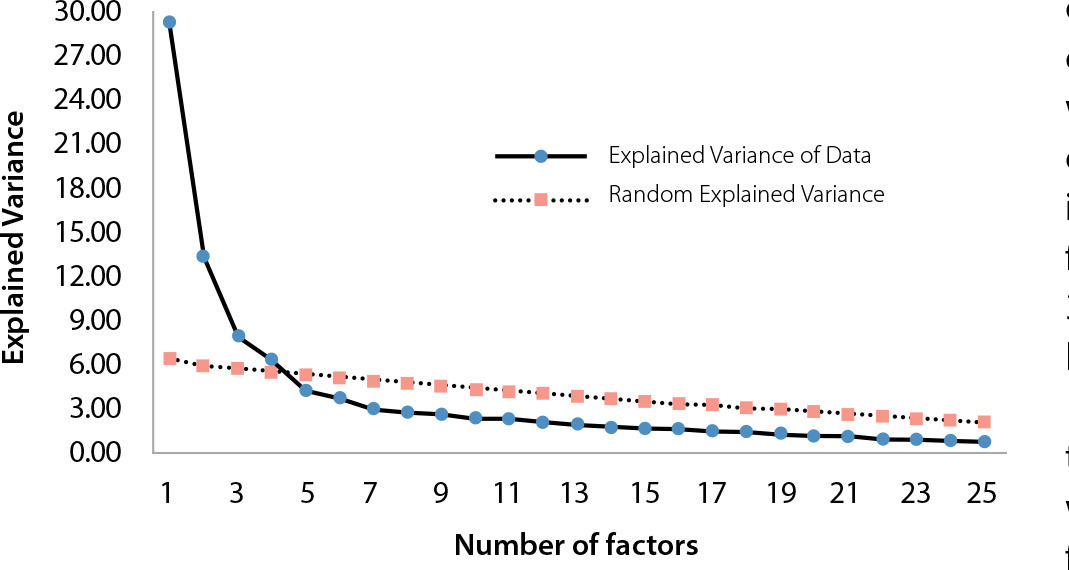
-
ORIGINAL ARTICLE07-29-2024
Nurses’ perspectives on nurses’ work methods
Revista Brasileira de Enfermagem. 2024;77(3):e20230374
Abstract
ORIGINAL ARTICLENurses’ perspectives on nurses’ work methods
Revista Brasileira de Enfermagem. 2024;77(3):e20230374
DOI 10.1590/0034-7167-2023-0374
Views0See moreABSTRACT
Objectives:
To analyze nurses’ perspectives on nurses’ work methods in the hospital context.
Methods:
A descriptive study with a qualitative approach was conducted in a hospital in northern Portugal, involving 17 nurses. Semi-structured interviews were used for data collection. Data collected between May and June 2023 underwent content analysis, supported by Atlas.ti software.
Results:
Three thematic areas emerged: “Nurses’ work methods in a hospital context,” highlighting the conception and components of work methods and the methods in use; “Implementation of nurses’ work methods,” emphasizing influencing factors and challenges to implementation; and “Impact of nurses’ work methods on patients, nurses, and institutions.”
Final Considerations:
Nurses’ work methods constitute the structure of nursing care. Some factors influence and some challenges arise in the implementation of these methods, producing impacts on patients, nurses, and institutions.

-
ORIGINAL ARTICLE07-29-2024
Nursing Process for institutionalized older adults: contributions from knowledge awareness workshop
Revista Brasileira de Enfermagem. 2024;77(3):e20230349
Abstract
ORIGINAL ARTICLENursing Process for institutionalized older adults: contributions from knowledge awareness workshop
Revista Brasileira de Enfermagem. 2024;77(3):e20230349
DOI 10.1590/0034-7167-2023-0349
Views0See moreABSTRACT
Objective:
To analyze the knowledge of professionals working in a Nursing Home about the Nursing Process before and after the awareness workshop.
Methods:
This is strategic action research, developed with nursing professionals and managers of a Nursing Home in Rio Grande do Sul, Brazil. Data were collected between January and June 2023, through semi-structured interviews before and after an awareness workshop. Discursive textual analysis of the data was carried out.
Results:
The central category “Understanding about the Nursing Process in Nursing Homes” emerged, which was unitized into two units of meaning and three categories of analysis.
Conclusion:
Data revealed non-use and lack of knowledge of the Nursing Process before awareness raising. Afterwards, a deeper understanding of the topic and its importance was identified. Awareness-raising workshops contribute to transformation of knowledge.
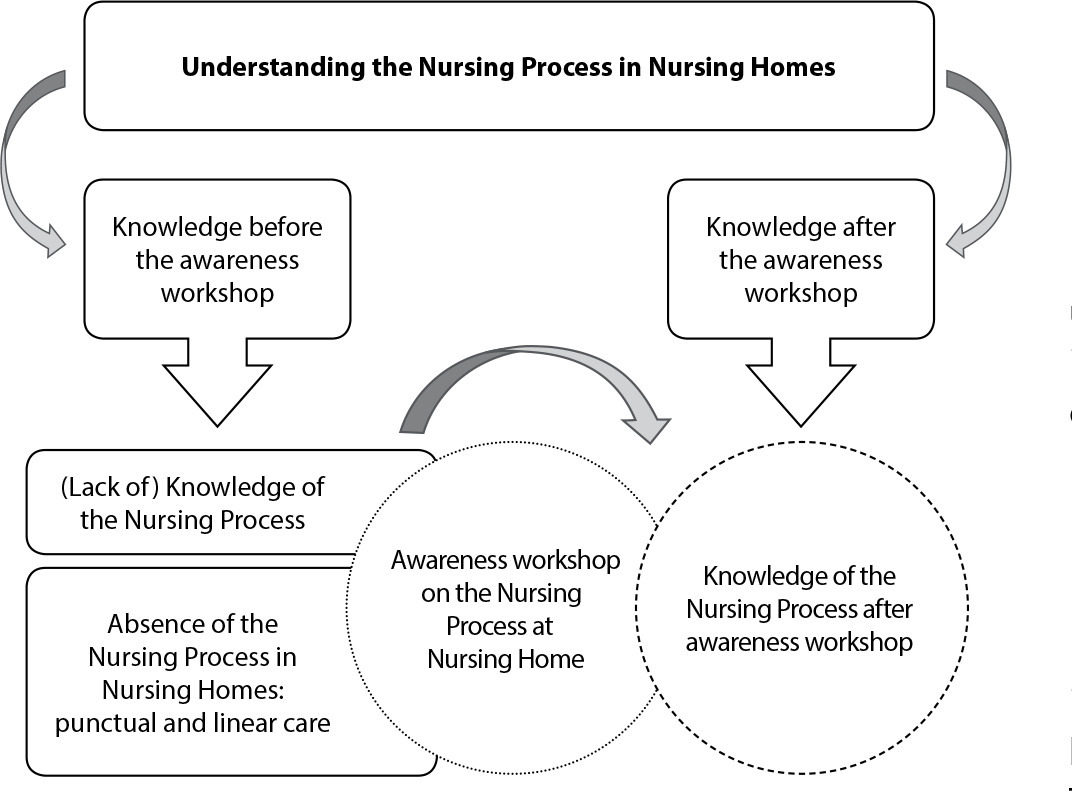
-
ORIGINAL ARTICLE07-29-2024
Excessive daytime sleepiness in nursing technicians: association with sleep quality and memory
Revista Brasileira de Enfermagem. 2024;77(3):e20230332
Abstract
ORIGINAL ARTICLEExcessive daytime sleepiness in nursing technicians: association with sleep quality and memory
Revista Brasileira de Enfermagem. 2024;77(3):e20230332
DOI 10.1590/0034-7167-2023-0332
Views0See moreABSTRACT
Objective:
to investigate excessive daytime sleepiness prevalence among nursing technicians and the association with sleep quality and memory.
Methods:
a cross-sectional, inferential study, carried out in a hospital unit in the state of Goiás between December 2020 and January 2021. Assessments were carried out using the Epworth Sleepiness Scale, the Pittsburgh Sleep Quality Index and the Prospective and Retrospective Memory Questionnaire, instruments validated for the Brazilian context. Bivariate and multivariate logistic regression analyzes were performed.
Results:
the sample consisted of 189 nursing technicians with a 40.9% excessive daytime sleepiness prevalence. In multivariate models, excessive daytime sleepiness was not associated with sleep quality, however there was a significant association with overall memory failures.
Conclusions:
study results demonstrate a high excessive daytime sleepiness occurrence, an association with overall memory failures and the need for psychosocial interventions for nursing technicians.
-
ORIGINAL ARTICLE07-29-2024
Educational technology for multidisciplinary training for managing waiting lists for elective patients
Revista Brasileira de Enfermagem. 2024;77(3):e20230299
Abstract
ORIGINAL ARTICLEEducational technology for multidisciplinary training for managing waiting lists for elective patients
Revista Brasileira de Enfermagem. 2024;77(3):e20230299
DOI 10.1590/0034-7167-2023-0299
Views1See moreABSTRACT
Objectives:
to construct and assess an educational technology for managing patient waiting lists for multidisciplinary training.
Methods:
study supported by Instructional Design – ADDIE model, whose stages of construction of educational technology were developed in the form of a multi-professional training course. Its respective content assessment was carried out by a committee of experts from 2021 to 2022. The analysis occurred based on the proportion of content adequacy with 95% Confidence Interval.
Results:
seventeen products were created as educational technology learning objects: five storyboards; four videos; three comic books; two pedagogical action plans; a mind map; and a YouTube® playlist. Nine experts assessed content adequacy, which reached 0.89.
Conclusions:
this educational technology contributes to the performance of professionals who manage waiting lists by reducing inequalities, alleviating differences, in addition to promoting equity in care and good health for patients in the Brazilian Health System.

-
ORIGINAL ARTICLE07-29-2024
Fuzzy Logic: vulnerability of women who have sex with women to sexually transmitted infections
Revista Brasileira de Enfermagem. 2024;77(3):e20230271
Abstract
ORIGINAL ARTICLEFuzzy Logic: vulnerability of women who have sex with women to sexually transmitted infections
Revista Brasileira de Enfermagem. 2024;77(3):e20230271
DOI 10.1590/0034-7167-2023-0271
Views0ABSTRACT
Objective:
To describe the possibility of applying Fuzzy Logic in analyzing the vulnerability of Women Who Have Sex with Women to Sexually Transmitted Infections/HIV/AIDS.
Methods:
We developed a Fuzzy Logic system with 17 input variables and one output variable, using data related to vulnerability in a municipality located in the Midwest region of the State of São Paulo, Brazil.
Results:
The factor with the greatest positive impact was the confirmation that a low understanding of Sexually Transmitted Infections/HIV/AIDS is associated with higher vulnerability. Conversely, the statement “Not disclosing sexual activity to healthcare professionals,” where individuals do not admit to having sex with women, had the least impact.
Conclusions:
Fuzzy Logic facilitates the identification of vulnerability, expressed through the analysis of interaction between variables in each dimension. This makes it a promising method to assist in analyzing the vulnerability of specific populations.
Keywords:Fuzzy LogicHealth VulnerabilityReproductive HealthSexually Transmitted DiseasesWomen Who Have Sex With WomenSee more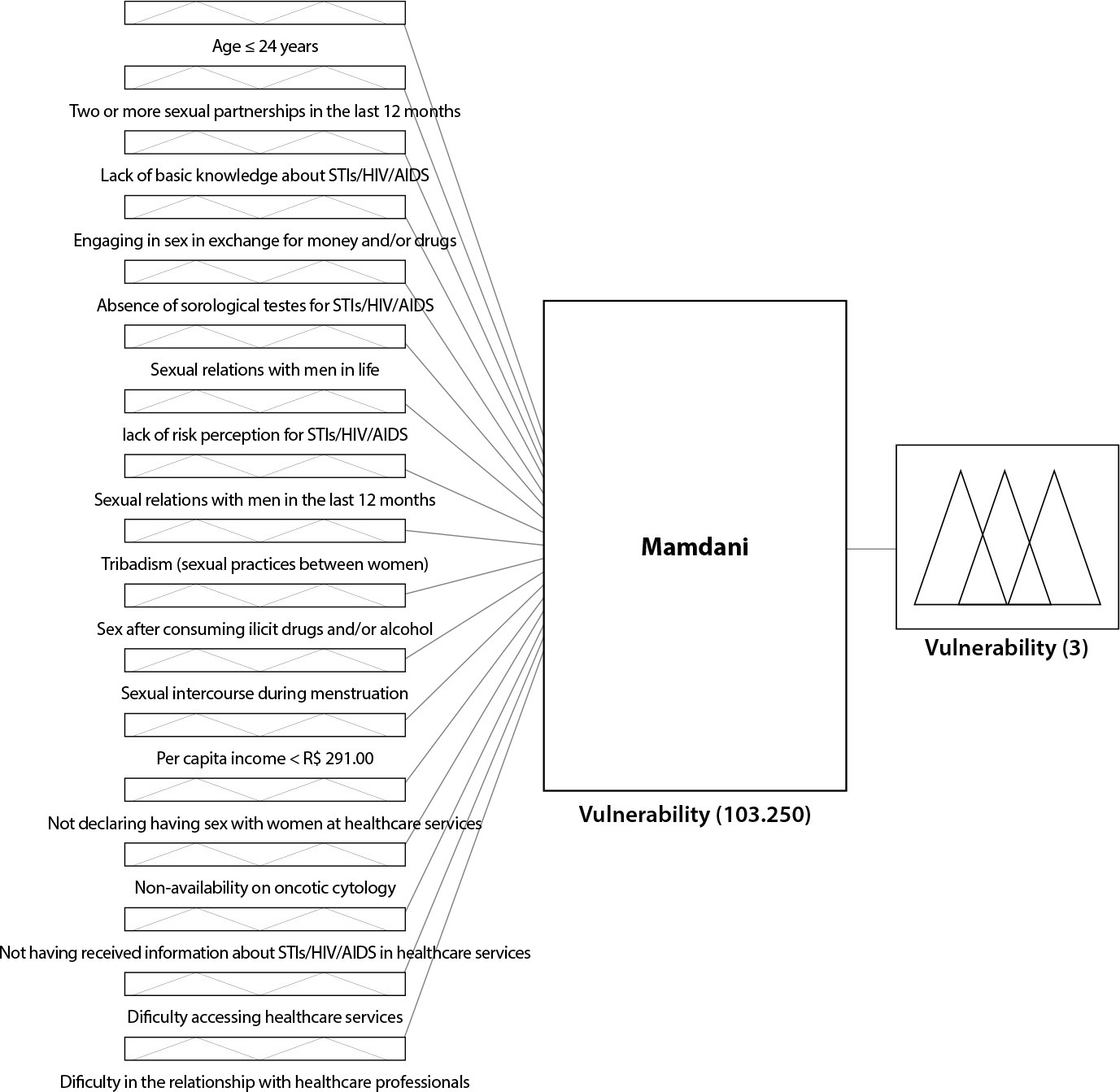
-
ORIGINAL ARTICLE07-29-2024
University Student Depression Inventory, Brazilian Version, Construct Assessment
Revista Brasileira de Enfermagem. 2024;77(3):e20230232
Abstract
ORIGINAL ARTICLEUniversity Student Depression Inventory, Brazilian Version, Construct Assessment
Revista Brasileira de Enfermagem. 2024;77(3):e20230232
DOI 10.1590/0034-7167-2023-0232
Views0See moreABSTRACT
Objectives:
to assess the University Student Depression Inventory, Brazilian version (USDI-BR), construct.
Methods:
a methodological study carried out with a snowball probabilistic sample, consisting of 334 undergraduate and graduate students. Confirmatory factor analysis, reliability using McDonald’s omega coefficient and Cronbach’s alpha were performed. Principal component analysis was performed using the varimax rotation and oblimin rotation, using the Kaiser-Meyer-Olkin criteria, Bartlett’s test of sphericity and scree plot.
Results:
the USDI-BR presented an internal consistency of items of ω = 0.95 and remained with 30 items, with the addition of 1 factor (Death wish and social withdrawal), totaling 4 factors.
Conclusions:
the USDI-BR has evidence that points to its validity and also its internal consistency, deserving that new studies be carried out to expand the evidence of its psychometric properties.
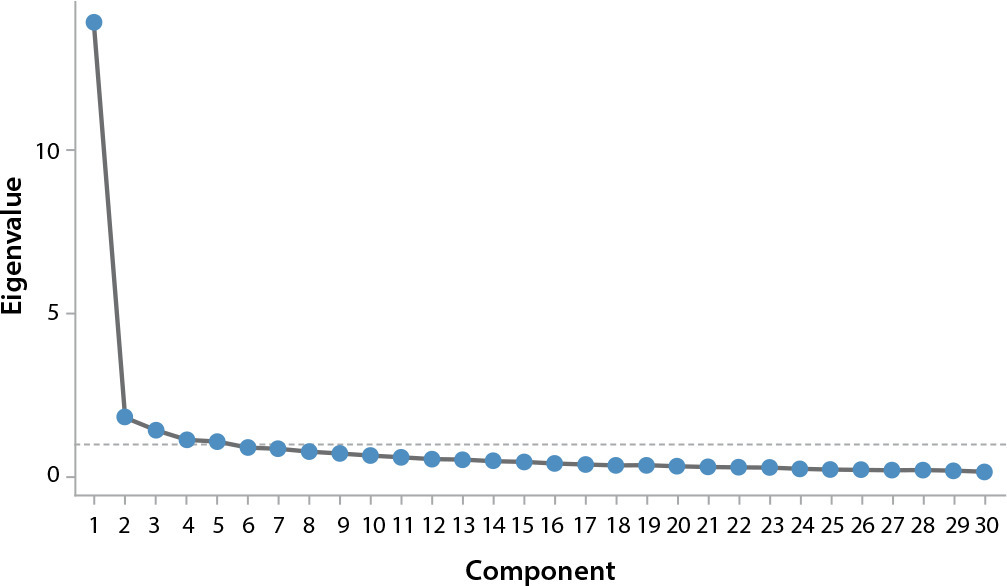
-
ORIGINAL ARTICLE07-29-2024
Family refusal of skin donation for transplantation: trends and associated factors
Revista Brasileira de Enfermagem. 2024;77(3):e20230209
Abstract
ORIGINAL ARTICLEFamily refusal of skin donation for transplantation: trends and associated factors
Revista Brasileira de Enfermagem. 2024;77(3):e20230209
DOI 10.1590/0034-7167-2023-0209
Views0See moreABSTRACT
Objectives:
to analyze the trends and factors associated with family refusal of skin donation for transplantation.
Methods:
this cross-sectional study was conducted in the State of São Paulo, with family authorization terms collected from 2001 to 2020. The variables analyzed included year, age, gender, cause of death, and type of institution. Data were analyzed using linear and multiple logistic regression, with the Odds Ratio estimated at p<0.05 for statistical significance.
Results:
1,355 individuals refused skin donation. The trend of refusals decreased between 2001 and 2009 in the age groups of 0-11 years and 12-19 years, but increased in the group aged ≥60 years. This trend continued to decrease in the 0-11 years group from 2010 to 2020, and increased in the 20-40 years group. Males and the age groups of 20-40 years, 41-59 years, and ≥60 years exhibited 27%, 34%, 47%, and 53% lower chances of refusal, respectively.
Conclusions:
there is an urgent need for measures to mitigate the high number of refusals associated with skin donation.
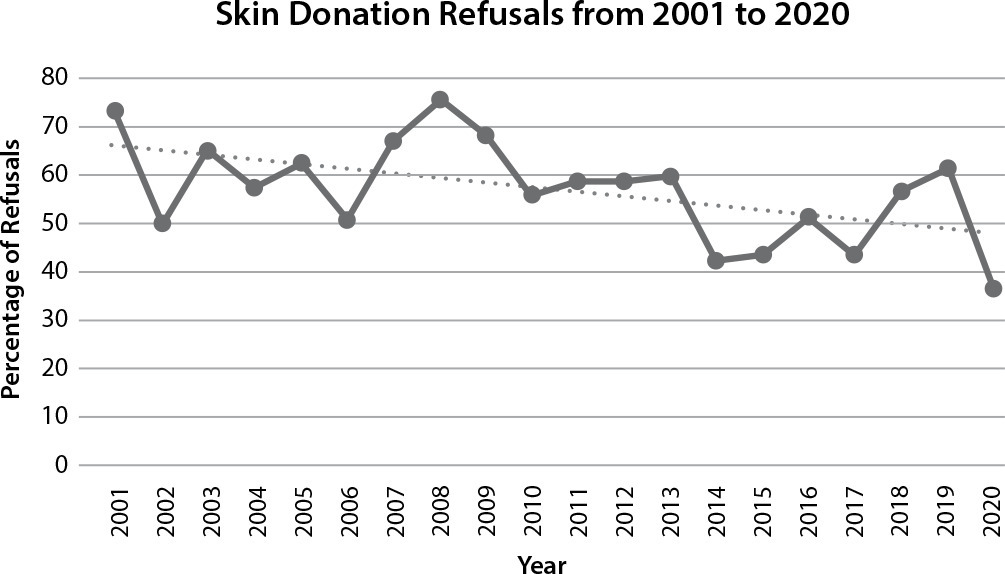
-
ORIGINAL ARTICLE08-11-2023
Agreement with COVID-19 disinformation among Portuguese-speaking older adults: an international study
Revista Brasileira de Enfermagem. 2023;76:e20230091
Abstract
ORIGINAL ARTICLEAgreement with COVID-19 disinformation among Portuguese-speaking older adults: an international study
Revista Brasileira de Enfermagem. 2023;76:e20230091
DOI 10.1590/0034-7167-2023-0091
Views0See moreABSTRACT
Objectives:
to assess agreement with COVID-19 disinformation among Portuguese-speaking individuals aged 50 years or older.
Methods:
a descriptive and analytical study involving 1,214 older adults born in Portuguese-speaking countries. Data collection occurred through online information mining to recognize COVID-19 and disinformation content, and the application of a structured questionnaire.
Results:
agreement with disinformation content was 65.2%. Residing outside Brazil is a protective factor for agreement with disinformation content, and those who believe in the truthfulness of the information sources they receive were 31% more likely to agree with disinformation content.
Conclusions:
there is a high prevalence of disinformation among the older population in two Portuguese-speaking countries, which should raise the attention of healthcare professionals and guide coping strategies.
-
ORIGINAL ARTICLE08-07-2023
Conhecimento e atitude dos estudantes de enfermagem em relação ao comportamento de prevenção à COVID-19
Revista Brasileira de Enfermagem. 2023;76:e20220588
Abstract
ORIGINAL ARTICLEConhecimento e atitude dos estudantes de enfermagem em relação ao comportamento de prevenção à COVID-19
Revista Brasileira de Enfermagem. 2023;76:e20220588
DOI 10.1590/0034-7167-2022-0588
Views0See moreRESUMEN
Objetivos:
determinar la correlación entre el nivel de conocimiento y las actitudes de los estudiantes de enfermería en relación a la conducta de prevención de la COVID-19.
Métodos:
estudio transversal realizado en una Universidad Privada de Indonesia. Se utilizó un muestreo accidental para seleccionar a 188 estudiantes de tercer año de enfermería como encuestados. La recolección de datos se realizó mediante un cuestionario en línea que consta de 27 preguntas (alfa de Cronbach 0.799-0.959). Los datos fueron analizados de forma descriptiva e inferencial.
Resultados:
el 49,5 % de los encuestados tenía conocimientos altos, el 98,4 % tenía una actitud positiva y el 89,9 % tenía un comportamiento positivo en la prevención de la transmisión de la COVID-19. La prueba de Chi-cuadrado reveló que el conocimiento no tiene correlación con el comportamiento de prevención de COVID-19 (valor de p 0,864), pero la actitud sí (valor de p 0,027).
Conclusiones:
las actitudes de los estudiantes de enfermería están relacionadas con el comportamiento en la prevención del COVID-19. Se espera que los estudiantes de enfermería mantengan actitudes y comportamientos positivos hacia la prevención de COVID-19 como futuros profesionales de la salud en la primera línea de los servicios de salud.
-
ORIGINAL ARTICLE08-07-2023
Nursing students’ knowledge and attitude in relation to COVID-19 prevention behavior
Revista Brasileira de Enfermagem. 2023;76:e20220588
Abstract
ORIGINAL ARTICLENursing students’ knowledge and attitude in relation to COVID-19 prevention behavior
Revista Brasileira de Enfermagem. 2023;76:e20220588
DOI 10.1590/0034-7167-2022-0588
Views0See moreABSTRACT
Objectives:
to determine the correlation between nursing students’ level of knowledge and attitudes toward COVID-19 prevention behavior.
Methods:
a cross-sectional study was carried out at the Private University in Indonesia. Accidental sampling was used to select 188 third-year bachelor’s nursing students as respondents. Data collection was conducted through an online questionnaire (Cronbach’s Alpha 0.799-0.959) consisting of 27 questions. The data were analyzed descriptively and inferentially.
Results:
as many as 49.5 % of respondents had high knowledge, 98.4 % had a positive attitude, and 89.9 % had positive behavior in preventing COVID-19 transmission. The Chi-square test revealed that knowledge has no correlation with COVID-19 prevention behavior (p-value 0.864), but attitude did (p-value 0.027).
Conclusions:
nursing students’ attitudes are related to behavior in preventing COVID-19. Nursing students are expected to maintain positive attitudes and behaviors toward COVID-19 prevention as future health workers at the forefront of health services.
-
ORIGINAL ARTICLE08-07-2023
Senso de coerência e apoio social como preditores de saúde mental durante a pandemia de COVID-19
Revista Brasileira de Enfermagem. 2023;76:e20220468
Abstract
ORIGINAL ARTICLESenso de coerência e apoio social como preditores de saúde mental durante a pandemia de COVID-19
Revista Brasileira de Enfermagem. 2023;76:e20220468
DOI 10.1590/0034-7167-2022-0468
Views0See moreRESUMEN
Objetivos:
verificar el papel del sentido de coherencia, sentido de coherencia nacional, apoyo social y confianza en las instituciones como predictores de salud mental en brasileños durante la pandemia de COVID-19.
Métodos:
estudio transversal, realizado de noviembre de 2020 a enero de 2021 mediante cuestionario online. Se utilizaron instrumentos estandarizados. La muestra estuvo compuesta por 1.630 brasileños. En el análisis de datos se realizaron correlación de Pearson y regresión lineal.
Resultados:
el sentido de coherencia fue el único predictor de ansiedad [β= -0,61;p<0,001], explicando el 38% de la variación de sus puntuaciones, mientras que el sentido de coherencia [β=0,52;p<0,001], sentido de coherencia nacional [β= 0,16;p<0,001] y apoyo social [β=0,15;p<0,001] fueron predictores de salud mental positiva y en conjunto explicaron el 51% de su variación.
Conclusiones:
los hallazgos sugieren que sentido de coherencia, sentido de coherencia nacional y el apoyo social representan importantes predictores de salud mental y que el fortalecimiento de estos recursos, podría potencialmente promover la salud mental de los brasileños.
-
ORIGINAL ARTICLE08-07-2023
Sense of coherence and social support as predictors of mental health during COVID-19 pandemic
Revista Brasileira de Enfermagem. 2023;76:e20220468
Abstract
ORIGINAL ARTICLESense of coherence and social support as predictors of mental health during COVID-19 pandemic
Revista Brasileira de Enfermagem. 2023;76:e20220468
DOI 10.1590/0034-7167-2022-0468
Views0See moreABSTRACT
Objectives:
to verify the role of sense of coherence, sense of national coherence, social support and trust in institutions to predict mental health in Brazilians during the COVID-19 pandemic.
Methods:
a cross-sectional study, carried out from November, 2020 to January, 2021 via an online survey. Standardized instruments were used. The sample consisted of 1,630 Brazilians. Pearson’s correlation and linear regression were performed in data analysis.
Results:
sense of coherence was the only predictor of anxiety [β= -0.61; p<0.001], explaining 38% of the variance in its scores, while sense of coherence [β= 0.52; p<0.001], sense of national coherence [β= 0.16; p<0.001], and social support [β= 0.15; p<0.001] predicted positive mental health and together explained 51% of its variance.
Conclusions:
the findings suggest that sense of coherence, sense of national coherence and social support represent important predictors for mental health and that strengthening these resources, could potentially promote Brazilians’ mental health.
-
ORIGINAL ARTICLE08-07-2023
Factors associated with the time to treat breast cancer in the pandemic period: an observational study
Revista Brasileira de Enfermagem. 2023;76:e20220428
Abstract
ORIGINAL ARTICLEFactors associated with the time to treat breast cancer in the pandemic period: an observational study
Revista Brasileira de Enfermagem. 2023;76:e20220428
DOI 10.1590/0034-7167-2022-0428
Views0See moreABSTRACT
Objectives:
to analyze the factors associated with the time to surgical treatment for breast cancer in patients seen at a reference mastology outpatient clinic in the State of Ceará.
Methods:
analytical, longitudinal study with medical charts from the Mastology Outpatient Clinic of Assis Chateaubriand Maternity School. We used 140 medical charts of breast cancer patients with surgeries performed during the pandemic.
Results:
the study evidenced associations between schooling and shorter time to treatment in patients who underwent biopsy before the first outpatient visit (p = 0.026; OR: 0.16; CI = 0.03-0.85); in the group who had the biopsy performed by the outpatient clinic, was associated the type of tumor (p = 0.019) and neoadjuvant therapy (p = 0.000).
Conclusions:
the lesser educational level, tumor type, and use of neoadjuvant therapy were factors associated with the time to treatment during the pandemic period.
-
Chemsex and its repercussions on the health of men who have sex with men (MSM): a global health perspective
Revista Brasileira de Enfermagem. 2023;76(3):e20230004
Abstract
Chemsex and its repercussions on the health of men who have sex with men (MSM): a global health perspective
Revista Brasileira de Enfermagem. 2023;76(3):e20230004
DOI 10.1590/0034-7167-2023-0004
Views0See moreABSTRACT
Objectives:
to discuss the repercussions of chemsex on the health of men who have sex with men (MSM), contextualizing it in a global health scenario and pointing out the implications for nursing care.
Methods:
theoretical-reflexive study based on scientific literature and concepts related to global health.
Results:
we present the epidemiology of the chemsex phenomenon, the main demands of the field, the reasons why it has become a global public health problem, and the implications for nursing practice.
Final Considerations:
chemsex is growing in all age groups of MSM and is globally benefiting from location-based applications to gain magnitude, finding an important potential audience in the migrant population. Nursing structures can help accelerate the proposal and implementation of biomedical and behavioral measures to address chemsex in its entirety, qualifying care and inducing teamwork with interprofessional collaboration.
Search
Search in:
Nuvem de Tags
Aged (144) Atenção Primária à Saúde (239) COVID-19 (104) Cuidados de Enfermagem (269) Educação em Enfermagem (151) Educação em Saúde (139) Enfermagem (930) Estudos de Validação (131) Health Education (144) Idoso (208) Mental Health (149) Nursing (987) Nursing Care (306) Patient Safety (151) Primary Health Care (284) Qualidade de Vida (104) Quality of Life (106) Saúde Mental (145) Segurança do Paciente (150) Validation Studies (108)




